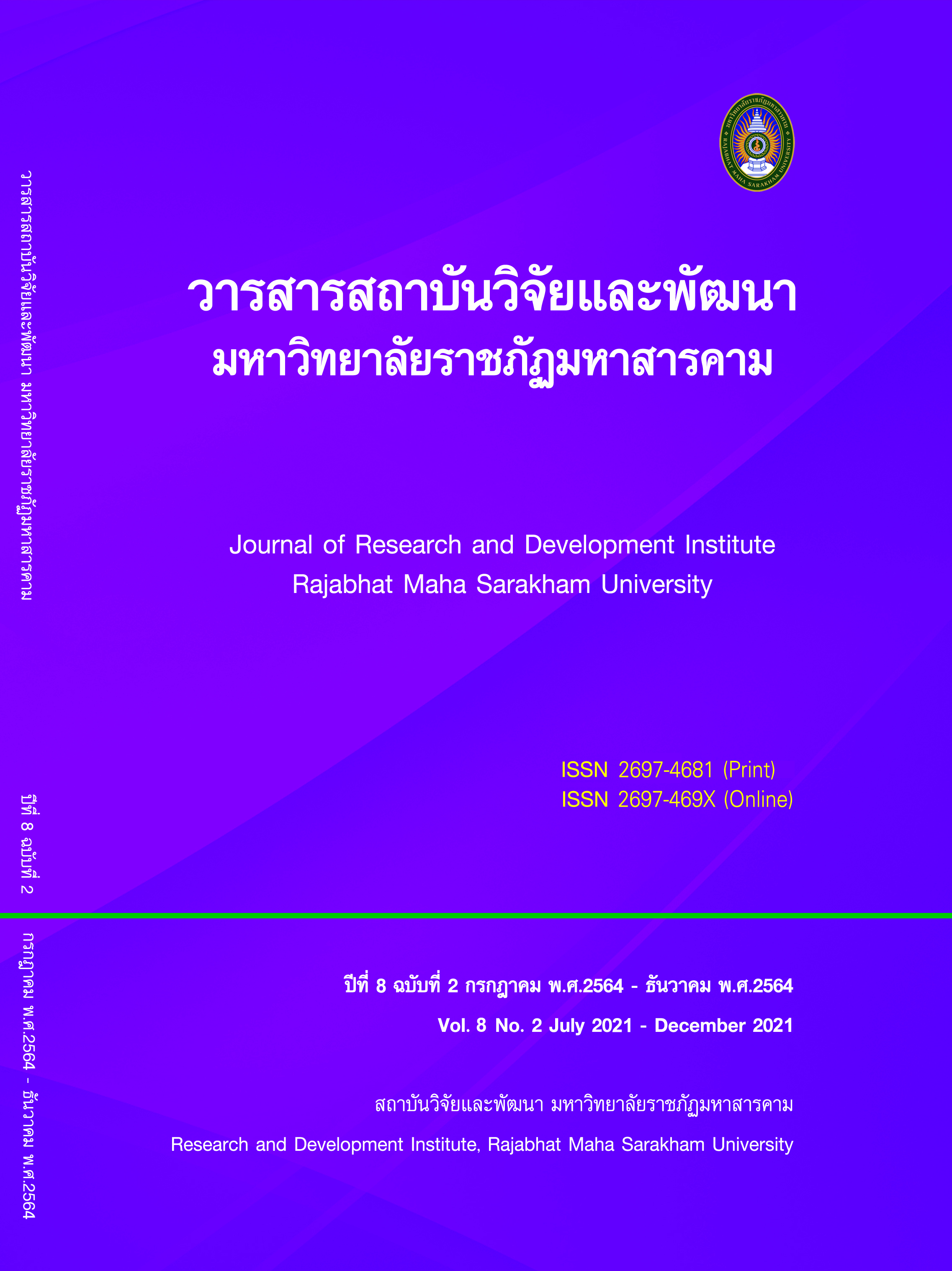The study of the results of applying the Philosophy of Sufficiency Economy to the Management of the School mission under the Secondary Educational Service Area Office 24
Keywords:
Instructional leadership, School administratorsAbstract
The purposes of this research were to 1) study of the results of applying the philosophy of sufficiency economy to the management of the school mission and 2) study the guideline for developing of applying the philosophy of sufficiency economy to the management of the school mission under the secondary educational service area office 24. The research process was divided to 2 phases: Phase 1 to study of the results of applying the philosophy of sufficiency economy to the management of the school mission, The sample group used in the research was 330, school administrator and teachers. The instruments used in this research were It was a 5-level scale questionnaire, The statistics used for data analysis were mean, percentage, standard deviation. Phase 2 to study the guideline for developing of applying the philosophy of sufficiency economy to the management of the school mission. The target group is 3 people. Tools for collecting interview information Data analysis by content analysis a structured equation.
The research results were found that
- The results of applying the philosophy of sufficiency economy to the management of the school mission in overall and in each aspect at a high level, by raking from maximum to minimum average following 1) general administration 2) budget administration 3) personnel administration and 4) academic administration
- guideline for developing of applying the philosophy of sufficiency economy to the management of the school mission include 1) Schools should have a policy that implements the philosophy of sufficiency economy in every aspect of the school setting 2) School administrators and teachers should plan the budget management of the school to be appropriate and in line with the sufficiency economy philosophy 3) Teachers should integrate instructional management and promote the sufficiency of learners according to the philosophy of sufficiency economy and 4) School administrators should encourage education personnel to develop themselves and create knowledge and understanding, Realize the value of the philosophy of the sufficiency economy.
References
Jadaman, P. (2015). Demission and dynamic; human resource management in millennium to sustainable. Maha Sarakham: Khumprintings.
Kim-Sao, R. (2017). Administration of educational institutions according to the philosophy of sufficiency economy of educational institutions. Under the Surat Thani Primary Educational Service Area Office, District 3. Independent study. Surat Thani: Surat Thani Rajabhat University.
Krejcie, R. V. & Morgan, D. W. (1970). Determining Sample Size for Research Activities. Educational and Psychological Measurement.
Ministry of Education. (2009). Guidelines for sufficiency economy supervision to educational institutions. Bangkok: Office of the Royal Development Projects Board.
Ministry of Education. (2013). School Management Manual, Personnel Dimension Management Development Project. Bangkok: Agricultural Cooperatives Association of Thailand.
Nipphayo, Phra Rapeepong and Sricharumedhiyan, C. (2021). “Solving Integrated Social Problems using the Layperson Principle”. Interdisciplinary Academic and Research Journal, 1 (5), 59-76.
Petchroj, L. and Chamniprasart, A. (2002). Research methodology. Bangkok: Pimdeekarnpim.
Phibunsarawut, P. (2013). New Theory Sufficiency Economy. Bangkok: Crown Property Bureau.
Phrakhru Passornsantitham, Srikod, D and Srikod, K. (2021). “The Learning Process of Chemical Reduction and Use of Chemicals in Safety Radius of Ban Non Sawang Community, Sao Lao Sub-district, Nong Kung Si District, Kalasin Province”. Interdisciplinary Academic and Research Journal, 1 (5), 17-36.
Rathanit, S. (2013). Principles, theory and practice of educational administration. (4thed) . Bangkok: Pimdeekarnpim.
Regional education office No.2. (2019). Report of the results of the assessment of educational institutions that are assessed as learning centers according to the philosophy of sufficiency economy in the area of responsibility of Regional education office No.2. Pathum Thani: Regional education office No.2.
Sangiamjit, P. (2008). Effective organization management. Ubon Ratchathani: Ubon Ratchathani Rajabhat University.
Sa-nguan-nam, C. (2008). Theory and practice in educational institution. (2nded). Bangkok: Book Point.
Secondary Educational Service Area Office 24. (2017). Government Action Plan for the year 2017. Kalasin: Secondary Educational Service Area Office 24.
Srisaat, B. (2013). Statistical Methods for Research, Volume 1 (5nded). Bangkok: Suwiriyasan.
Teerathongdee, P. (2010). Applying the Sufficiency Economy Philosophy in the Management of Educational Institutions Under the Ratchaburi Educational Service Area Office 2. Master of Thesis: Muban Chom Bueng Rajabhat University.
Termpittayapaisit, A. (2011). ASEAN Community. Bangkok: Office of the National Economic and Social Development Board.
Thongphakdee, N. (2007). Sufficiency Economy Philosophy:Historical Background and Interpretation. NIDA Development Journal Vol. 47 No. 1 (2007).
Downloads
Published
How to Cite
Issue
Section
License
Copyright (c) 2021 Journal of Research and Development Institute Rajabhat Maha Sarakham University

This work is licensed under a Creative Commons Attribution-NonCommercial-NoDerivatives 4.0 International License.
Articles that are published are copyrighted by the authors of the articles







